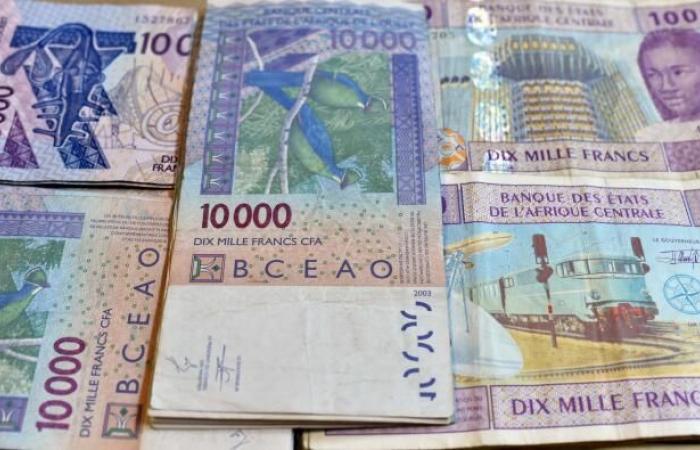The last legacy of the French colonial era for some, a formidable tool of economic stability for others, the CFA franc continues to fuel economic debates in Africa. The tendency is more towards pamphlet than praise within African and even international political circles. Most countries using this monetary currency are seeking to get rid of it. The latest example, Senegal and its new president, Bassirou Diomaye Faye, former opponent of former president Macky Sall, seem to want to turn away from the CFA franc. The latter therefore seems more than threatened from now on. However, are its plausible alternatives viable for the 14 countries that use it?
The CFA franc: what is it?
Created in 1945 by France, the CFA franc is the common currency of 14 African countries divided into two monetary unions:
- UEMOA (West African Economic and Monetary Union), with Benin, Togo, Niger, Mali, Burkina Faso, Ivory Coast, Guinea-Bissau and Senegal (Dakar being the headquarters of the BCEAO, the Central Bank of West African States);
- la Cemac (Central African Economic and Monetary Community), with Congo, Gabon, Central Africa, Chad, Equatorial Guinea and Cameroon (Yaoundé being the headquarters of the BEAC, Bank of Central African States), representing approximately 160 million Africans.
From 1960 to 1999, the currency was pegged to the franc and, since 1999, to the euro with a fixed exchange rate of 655.97 CFA francs for 1 €. This free convertibility provides the CFA franc with a certain economic stability and remains a major argument for foreign investors. However, the French State must act as guarantor in the event of failures of African central banks, because printing the CFA franc therefore amounts to printing the euro due to indexation.
Thus, in exchange for this guarantee, the countries of the CFA zone are obliged to deposit 50% of their foreign exchange reserves with the French Treasury. In 2023, this would represent around eight billion euros. It is precisely this agreement which is castigated by African countries, who believe that France is seeking to keep control of their economy in a paternalistic, even neocolonialist, approach.
A currency under fire from critics
Critics comparing the CFA franc to a vestige of the colonial era are not all young. Indeed, Guinea (in 1960), Mali (in 1962) and Madagascar (in 1973) have, for this reason, chosen to leave the African economic community to create their own monetary currency. Bamako, however, had no choice but to reintegrate the CFA zone in 1984 because of its terrible economic difficulties.
In 1998, the French journalist François-Xavier Verschave in turn pointed out French economic actions in Africa in his book Françafrique, the longest scandal of the republic. Even the name of the currency has long been the subject of controversy. Indeed, the acronym CFA designated “French colonies of Africa” from 1945 to 1958, before being replaced by “African financial community” and “African financial cooperation”.
Even today, many believe that the CFA franc limits the economic and political sovereignty of countries in the CFA zone and sometimes prevents them from investing as they wish in development projects. In 1994, the IMF, the World Bank and especially Paris forced the leaders of the CFA zone to accept a half devaluation of their currency due to their economic problems. For all of these reasons, the countries of the CFA zone have decided to do without the CFA franc and to implement a new currency: the echo.
The eco: a mirage?
An idea full of promise, but difficult to implement
During the 42e session of the West African Monetary Zone Convergence Council in Conakry, Guinea, August 23, 2019, the eight UEMOA countries, as well as Cape Verde, Gambia, Ghana, Guinea , Liberia, Sierra Leone and Nigeria, agree to create the eco and put it in place for the third quarter of 2020. Which never happened. The project is not new, the first discussions about it date from the 1960s, highlighting the desire of all African countries to get rid of the CFA franc for a long time.
Despite this first failure, the countries concerned seem determined to do without the CFA franc and the eco could allow the creation of a large African monetary union, the first of its kind, bringing together more than 350 million people within the ECOWAS. By following the European Union model, the latter could boost intraregional investments and connectivity between its member statesby reducing the costs linked to exchange between the different currencies that make it up. Intra-African trade is only 10-15%, while intra-EU trade is around 60%.
A common currency could be the key to meeting this challenge and would allow ECOWAS to become a ZIR (regional integration zone) that counts internationally. The latest figures from the World Bank show that regional growth rates are on the rise: + 5.9% in 2024 and + 6.2% in 2025 for WAEMU. Thus, freeing itself from the CFA franc would allow the zone to combine its economic takeoff with financial independence.
Other countries are in more of a hurry and are desperately seeking to get rid of French supervision, in particular Mali, Niger and Burkina Faso. Bamako, Niamey and Ouagadougou have also created the AES (the Alliance of Sahel States) in September 2023after leaving ECOWAS, considered too pro-French, and intend to create their own currency, the Sahel.
Insurmountable obstacles to its implementation?
This drastic economic change is not without risks. Abandoning a fixed parity system can cause serious economic crises. This was particularly the case in Argentina in 2001. Buenos Aires had abandoned the fixed parity between the Argentine peso and the dollar, creating hyperinflation caused by the devaluation of the currency and the fear of investors. All of this increased poverty and caused a social crisis that is still relevant today.
Within ECOWAS, the prospect of the establishment of a gigantic monetary union frightens most member states due to the omnipotence of Nigeria (which represents 67% of the zone’s GDP) and its recent economic difficulties. and sociopolitical.
The translation of a decline in French influence in Africa
The end of Françafrique
The desire to get rid of the CFA franc is also linked to France’s loss of influence on the entire African continent. During Emmanuel Macron’s 2023 African tour, the President of the Democratic Republic of Congo, Félix Tshisekedi, summed up the thinking of most African countries with these words: “The paternalistic view of France must change, because Françafrique no longer exists. We must establish a policy of equals. »
In recent times, France has seen its influence regress over its former preserve. A phenomenon that has worried former President Jacques Chirac for several years, going so far as to declare: “Without Africa, France will descend to the rank of Third World power. » And the abandonment of the CFA franc by 14 African countries is therefore viewed with a negative eye in Paris.
Also read: Summer news: France’s departure from Mali and France in Africa: time for divorce
The arrival of new countries
The place left by Paris is desired by multiple actors. In addition to the Chinese and Russian powers who have been investing in the continent for decades and who have already signed multiple trade agreements with the countries of the CFA zone, we are witnessing the emergence of endogenous powers. At the forefront are Algeria and Morocco, who are waging a new battle to influence the countries of the Sahel.
On February 13, 2024, Algerian President Abdelmadjid Tebboune announced the creation of free zones with Mali and Niger to strengthen their ties. As for Morocco, Sovereign Mohammed VI himself established the Atlantic Initiative for the Sahel with the three AES countries and Chad, on December 23, 2023.
Is the CFA franc definitely out of the game?
Despite all the criticism and the desire to get rid of it, the CFA franc is still the official currency of 14 countries in West and Central Africa. Better yet, Nigeria, which has faced inflation of more than 30% since the start of 2024 and which has seen the price of the naira, the official currency, collapse, has partially adopted the CFA franc. Indeed, several Nigerian regions bordering countries in the CFA zone have unofficially started using the CFA franc in most of their commercial transactions. The same phenomenon could be observed in Ghana, which is also experiencing difficulties with its currency, the cedi.
This is explained by the fact that the CFA franc has become a refuge currency within a continent which faces the highest inflation rates in the world. Its relative stability and the fact that it is pegged to the euro, one of the strongest and most stable currencies in the world, reassure investors and creditors. Thus, the reason why most countries in the CFA zone want to abandon the CFA franc is also the reason why this currency is so popular currently. Which does not fail to fuel controversy…
Don’t hesitate to consult all our geopolitics resources!






